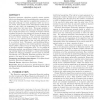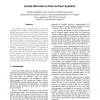211 search results - page 21 / 43 » A Message Recognition Protocol Based on Standard Assumptions |
PODC
2006
ACM
14 years 1 months ago
2006
ACM
Byzantine agreement algorithms typically assume implicit initial state consistency and synchronization among the correct nodes and then operate in coordinated rounds of informatio...
CN
2006
13 years 8 months ago
2006
In certain reliable group-oriented and multicast applications, a source needs to securely verify whether all (and if not all, which) intended receivers have received a message. How...
WONS
2005
IEEE
14 years 1 months ago
2005
IEEE
At present, no standard frequency allocation mechanism exists for Wireless LAN access points. In this article, we introduce a number of techniques based on graph colouring algorit...
CRYPTO
2000
Springer
13 years 11 months ago
2000
Springer
We present efficient non-malleable commitment schemes based on standard assumptions such as RSA and Discrete-Log, and under the condition that the network provides publicly availab...
HICSS
2005
IEEE
14 years 1 months ago
2005
IEEE
The Gnutella protocol requires peers to broadcast messages to their neighbours when they search files. The message passing generates a lot of traffic in the network, which degrade...


